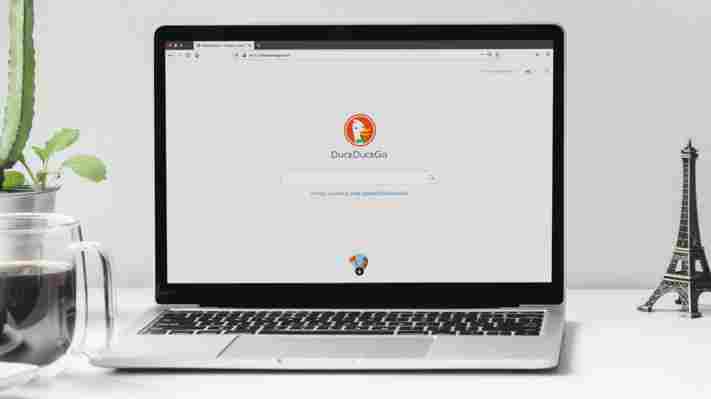Google benefits from almost every advantage any company could ever hope for; it has the most advanced technology, broadest talent pool, greatest lobbying power and some of the deepest pockets. Most importantly, it has a vice-like grip on many of the markets in which it operates, particularly browsers and search .
Some might think it impossible to overthrow a company in this position, especially in its core areas of business. But not Gabriel Weinberg, who is patiently twirling his sling in anticipation of an opportunity to bring down the internet’s Goliath.
Weinberg is the founder of DuckDuckGo, which is best known for its private search engine, but now provides a suite of privacy-centric services. The company’s ambition is to help people defend against the predatory tracking technologies that underpin the advertising models of Google, Facebook and other web titans.
Safeguarding data privacy on the web was not the original raison d'être for DuckDuckGo, Weinberg told us, it was more about building something user-centric. But when the perils of surveillance capitalism became apparent, his vision was clarified.
“Many people don’t understand how much they are tracked and manipulated online,” he said. “They don’t appreciate the size of the profiles created by technology companies, and how they are being used not just to place ads all around them, but to determine the content they see online.”
“There’s a lot more polarization on the web due to filter bubbles and there’s also a lot of manipulative advertising that can lead to discrimination, propaganda and commercial exploitation. But now, we’re beginning to see some pushback.”

An entrepreneurial streak
In most contexts, “college dropout” is deployed as a pejorative term, but not so in the world of technology. The likes of Bill Gates, Steve Jobs, Mark Zuckerberg, Jack Dorsey and others have made a noble tradition of dropping out of prestigious universities.
Weinberg also left his college early, but only because he finished his four-year degree a year ahead of schedule. He was in a hurry because he was eager to launch his first business, an education technology platform that sought to involve parents more closely in the schooling process.
Weinberg says he has had an entrepreneurial streak from an early age. In middle school, he coded his own bulletin board system, and in high school he had a side job helping businesses connect to the web and solve other IT issues. The culture at MIT, where he spent a lot of time around students starting their own companies, only reinforced this natural resolve.
Although his first venture was not a success, Weinberg says he learned a few valuable lessons that set the tone for what was to come. After returning to MIT for a graduate degree, he launched a series of new projects, taking a scattergun approach. One of them was an early social network called NamesDatabase, which provided a way for people to find old friends with whom they had lost contact.

“It actually came out of an analysis of search engine traffic, finding that many people were searching for names of other people and not finding great results. So I tried to make a platform to help them find old friends and classmates. This was in 2003, right when Friendster was coming out, and MySpace shortly after,” he explained.
The idea caught on quickly and the company was snapped up by classmateom for $10 million in 2006. Weinberg had exited at the right time; the rise of Facebook quickly consigned NamesDatabase to the scrapheap.
Somewhat aimless in the aftermath of this success, Weinberg found himself hunting for a new “North Star”. He knew he wanted to do something that would have a “unique positive impact”, but not necessarily what that might look like.
“I was interested in search, purely from an intellectual point of view,” he told us. “And I had a lot of admiration for what Mozilla was doing in the web browser market, trying to build a user-centric product.”
Following his nose, Weinberg set about building what later became DuckDuckGo, a search engine he himself would want to use.
DuckDuckGo takes flight
DuckDuckGo took shape over a number of years, from 2008 onwards. Weinberg worked on the project here and there, making tweaks and improvements whenever his newborn son gave him a moment’s peace.
Until 2011, the project was funded entirely using Weinberg’s own cash, and he was also the sole developer. But recognizing DuckDuckGo was beginning to gain traction, he decided it was time to take on investment and hone in on the privacy-preserving aspect of his product.
The idea that the economics of the web had begun to work against the individual did not come to Weinberg in the form of some great epiphany, but dawned on him slowly during his first few years developing DuckDuckGo, he told us.
“It was a gradual realisation that came from simply watching what was happening. It became clear Google was changing from a search company to an advertising company. And that meant profiling people using not only their search data, but the other properties Google had acquired,” said Weinberg.
“It also became obvious that the market was undergoing a shift from contextual to behavioural advertising, which was getting creepier and creepier, and that searches were going to be used to power this new system.”

DuckDuckGo says it differs from Google in a number of crucial ways. The latter serves up different search results to different people depending on their age, gender, location, previous searches and a multitude of other factors, even if the search query is identical. DuckDuckGo, meanwhile, will generate the same results irrespective of who is making the search.
The advertising that appears in Google search results is also personalized on a per-user basis using the data the company collects across its various properties (Search, Gmail, Maps, Drive, YouTube, Android, Play Store etc.). Whereas under the DuckDuckGo model, the ads that appear in search results depend solely on the keywords that feature in the query. In simpler terms, a search about cars will throw up ads relating to cars.
The Google system and others like it create a variety of problems. The increase in the amount of content served up by algorithm-based search, news and social feeds is thought by some to have had a severe polarizing effect, making rational debate across political and social divides near impossible.
Second, there’s the problem of sensationalism and misinformation. A system in which publishers are beholden to the algorithms of Google, YouTube and Facebook for content distribution naturally incentivises embellishment and overstatement, increasing the likelihood that reporting spills over into mistruth in an effort to garner clicks.
Lastly, many privacy advocates take issue with the quantities of sensitive, user-level data collected by Google in support of its lucrative advertising business (which makes up more than 80% of its revenue). This data contributes towards creating highly detailed profiles of web users, who are served targeted ads for products they may not want or need. Worse, the individuals are not fairly compensated for providing the valuable raw material on which the system functions: their personal data.
By eliminating user profiles from the equation, DuckDuckGo hopes to address each of these negative effects. The company neither stores nor collects personal data on its users and neither does it take record of the searches specific people perform. And although a large proportion of its search results are populated via Microsoft Bing, which means Microsoft has access to anonymized and aggregated search data from DuckDuckGo, Weinberg says there is no way someone could be profiled as a result.
The search engine was the first piece of the puzzle, but DuckDuckGo also has a mobile browser and extension, which block tracking cookies, force websites to use encrypted connections where possible and assign sites with an overall privacy grade.
The company has been profitable since 2014, almost wholly thanks to its keyword-based advertising efforts, and estimates suggest the search engine now services roughly three billion search queries per month.
However, Weinberg says the success of the campaign to establish a more private web will depend upon the ability to create a new path of least resistance for users; privacy-preserving products will only reach a critical mass once it becomes simpler for people to make the switch.
“Most people currently say they care about privacy, but only half actually take action. We think this figure will continue to grow as consumers understand more and more about privacy harms,” he told us.
“However, bringing web users from one group to the other will also be about helping people appreciate there’s something they can do about these problems. We’re trying to be the easy button for privacy.”
Default is king
Irrespective of the quality of products on offer from challengers like DuckDuckGo, however, the opportunity to close the gap on Google and others is limited by the financial firepower of the incumbents, as well as their dominance across multiple sectors. The problem is that default is king, because many users will never bother to change their settings.
In the search market, Google is estimated to pay many billions of dollars every year to guarantee its spot as the default search engine across web browsers such as Safari and Firefox.
Meanwhile, Google Chrome is itself far and away the largest web browser on the market and the company’s stewardship of Android means it can build itself into the heart of most smartphones and tablets too. All of this means that the majority of internet users will make searches via Google by default.
To offset the power of the default and the dangers of the platform effect, Weinberg says it needs to be much simpler for users to make a wholesale switch to different service providers across a number categories, including browsers and search.
“On Android right now, it takes fifteen-plus clicks to change the default search engine, but we really think that should be one click,” he told us. “If this kind of system were in place, we could be five or ten times bigger today.”
“It’s very important to open up these kinds of industries. The answer to this problem is a regulatory one, so we’re working with bodies across the world to make this happen.”
Over the last few years, Weinberg has spoken to lawyers at the US Justice Department and testified at antitrust hearings on multiple occasions, mostly in relation to the auction process that now determines which search engines appear as alternative options during the Android setup process.
The system was implemented in compliance with an EU ruling from 2018 that determined Google had abused its monopoly in the mobile operating system space. However, the new pay-to-play auction system prices DuckDuckGo and other “purpose-driven” alternatives out of contention, and has therefore failed to recalibrate the balance of power in search.
Although progress is slow, Weinberg suggested he has faith that the necessary gears are now turning and that more effective regulation is on the horizon.
Branching out
Like other companies in the space, DuckDuckGo is in the process of branching out into new areas under the umbrella of privacy technology.
Beyond the search engine, mobile app and browser extension, Weinberg has now set his sights on the desktop browser space too, and it’s not difficult to work out why.
The power of the default means that whoever controls the browser market has significant influence over the search industry. If DuckDuckGo is able to attract a significant audience to its browser, it stands to gain an almost equally large number of search users too.
Although there are a number of privacy-centric browsers on the market already (perhaps most notably, Brave ), Weinberg says his company’s service will stand apart for its unrivalled usability.
“Like we’ve done on mobile, DuckDuckGo for desktop will redefine user expectations of everyday online privacy. No complicated settings, no misleading warnings, no ‘levels’ of privacy protection – just robust protection that works by default, across search, browsing, email, and more,” he explained.
“It's not a privacy browser; it's an everyday browsing app that respects users' privacy because there's never a bad time to stop companies from spying on searches and browsing history.”
DuckDuckGo has also recently released email -tracking protection and anti-app tracking features in beta, which will eventually be integrated fully into its products. And although Weinberg refused to be drawn into revealing any further projects, we imagine the company has a few additional tricks up its sleeve.
If regulators come up short, this expansion strategy will give DuckDuckGo an alternate route to expanding both its footprint and revenue.
Weinberg also says there is natural momentum behind projects like his own as a result of growing awareness of the importance of data privacy among the general public. Landmark events like the Snowden leaks and Cambridge Analytica scandal catalyzed this process, but the ready availability of services that help people take action will bring us to the tipping point, he says.
“If you feel that privacy is unattainable or comes at too great an expense, of course you’ll feel powerless to act,” said Weinberg. “We’re trying to let people know there really is a solution, an easy button for privacy that doesn’t involve a lot of sacrifice.”
Update: February 16, 2022 Since publication, Google has been in touch to contest the notion that its search results are personalized on a per-user basis; the differences are a product of the dynamic and distributed nature of its system , it contends. The company claims that DuckDuckGo search results differ for the same reason.
In support of its claims, Google gestured to recent research that suggests its search engine "is not pushing strong partisans into filter bubbles".
Separately, Google asserted that the quality of its own search results means that other providers, including DuckDuckGo, suffer a far more acute misinformation problem.
Is Invincible season 2 coming in 2022? Lead star weighs in
Invincible season 2 could be a long way off yet, according to comments made by the R-rated animated show's lead voice actor.
Steven Yeun, who stars as series protagonist Mark Grayson, told Collider that he hasn't been called upon to begin recording lines for Invincible season 2 . That'll be disappointing for fans of the hit animated series to hear, but Yeun added a caveat that means Invincible's second season will finally move into gear in the near future.
Asked how production on the show's next instalment was going, Yeun said: "We haven’t started. I know we’re starting at some point soon.
"I’ve talked to Robert [Kirkman, Invincible's co-creator], here and there. He’s super excited about it. He thinks Season 2 is gonna be even better than Season 1, which I have no doubt about. If you go to his source material, Invincible is an incredible comic, and just thinking about how much story hasn’t been told from that run, it’s gonna be bonkers. I’m really excited about it."
Yeun was also quizzed on how taken aback he was by Invincible's success. The Amazon Prime show , which is largely based on Kirkman and Cory Walker's beloved graphic novel series, started as something of a slow burn but, as we said in our review , Invincible's first season quickly gathered pace. That's before it delivered a season finale that was one of the most shocking (not to mention memeable) TV moments of 2021 – an ending that certainly sets up some major comic storylines for seasons 2 and 3.
Asked if he expected the fervent response that Invincible received, Yeun said: "I’ll be honest, I did not expect this level of response. People really enjoyed the show. That’s not to say that I thought the show wouldn’t be enjoyed. I just didn’t know how many people were coming to it like that.
"To me, I think it speaks to America’s appetite now for adult animation, which is really cool. I grew up on it. I think all of us, of our generation and below, grew up on it. I think we’re probably on the precipice of right before things really pop off. I think we’re gonna get some hopefully [Hayao] Miyazaki levels of animation. We do with Pixar, but I just mean coming from different places. It’s a new world."
Analysis: will we have to wait until 2023 for Invincible season 2?

On first glance, Yeun's comments suggest that any work is yet to begin on Invincible season 2. After all, the actor's use of the word "we" implies that the series' chief creative team haven't begun writing or storyboarding aspects of season 2.
In our view, though, some pre-production work on Invincible's second season will have been completed already. The season 1 finale aired on Amazon Prime in late April last year, which means there have been nine months for some aspects of development to have taken place.
True, the likes of Kirkman and Rogen are busy on other projects. But we're pretty confident in saying that conversations about season 2's plot, character introductions, themes and potential animation upgrades will have been discussed internally. Indeed, Kirkman has already commented on which characters will be included in Invincible's second season. There are plenty of story threads from season 1 that need to be resolved or picked up, too, alongside the sheer wealth of plot ideas that can be adapted from Kirkman and Walker's source material.
So yes, Invincible season 2 is unlikely to launch in 2022 – but Kirkman, Yeun and company could surprise us with a late Q4 2022 release. That, though, would be a tough ask, and would require a fair deal of crunch to get an episode or two out before the end of this year.
We suspect, then, that Invincible's second instalment won't arrive until early 2023. But, given how good its first season was, and how much work needs to be conducted to make season 2 even better, we're happy to wait.
Speed skating live stream: how to watch Beijing 2022 online for free, 1000m and Mass Start medals, can Bowe claim gold?
American Brittany Bowe will be looking to win her country its first speed skating medal in 20 years when she hits Beijing's Ice Ribbon at the 2022 Winter Olympics, on in the first few hours of Thursday for viewers in the States. The women's 1000m speed skating comes a day before the men's 1000m. Saturday sees the excitement of the mass start event for both categories. Make sure you know how to watch a speed skating live stream wherever you are.
Winter Olympics speed skating races vary in length from 500m to a whopping 10km. Cross the finish line first, and the gold medal is yours but so razor thin are the margins and so high-speed the skating, that the sport is always one to capture people's interest. Also known as “The Ice Ribbon,” the National Speed Skating Oval is the home of speed skating at Beijing 2022.
From the Netherlands, Sven Kramer is one to watch out for. This superstar skater is the first athlete ever to win four consecutive World All-round Championships which currently sit alongside his nine, yes, nine Olympic medals. But even Kramer's accomplishments pale next to those of fellow Dutch skater Ireen Wüst who is the most decorated active Winter Olympian with her 11 ribboned gongs.
The Winter Olympics speed skating takes place February 5–19. Below you'll find all the information on how to watch a speed skating live stream from the Beijing 2022 Winter Olympics, wherever you are in the world.
Beijing 2022 speed skating: dates and times
February 5
Women’s 3000m, Medals: 8:30am GMT, 3:30am ET, 12:30am PT
February 6
Men’s 3000m, Medals: 8:30am GMT, 3:30am ET, 12:30am PT
February 7
Women’s 1500m, Medals: 8:30am GMT, 3:30am ET, 12:30am PT
Watch a speed skating live stream with a VPN
There are so many events going on at the Winter Olympics that not every country's TV and streaming coverage shows every discipline. If you can't get the speed skating where you are, then you can use a VPN to tune into a live stream from another country – something you might need to do if travelling abroad.
By downloading and installing a VPN , you can effectively trick your computer into thinking that it's back at home in the same country as the streaming service that you're trying to access. That way you can enjoy your home coverage without having to find an illegal stream - assuming you comply with the broadcaster's fine print, of course.
Use a VPN to watch the speed skating from anywhere
How to use a VPN
Using a VPN is as easy as one-two-three...
1. Download and install a VPN - as we say, our top choice is ExpressVPN
2. Connect to the appropriate server location - open the VPN app, hit 'choose location', eg: select 'US' for Peacock, or 'UK' for BBC, 'Australia' for 7Plus or 'Canada' for CBC.
3. Go to the broadcaster's live stream - so that might be 7Plus , CBC , BBC iPlayer or Peacock TV .

Speed skating live stream: how to watch Beijing 2022 online in the UK

USA speed skating live stream: watch every Beijing 2022 event on Peacock

Speed skating live stream: how to watch Beijing 2022 online in Canada
Speed skating live stream: how to watch Beijing 2022 online in Australia
Watch the speed skating: live stream Beijing 2022 in New Zealand
Beijing 2022 Winter Olympics schedule and events